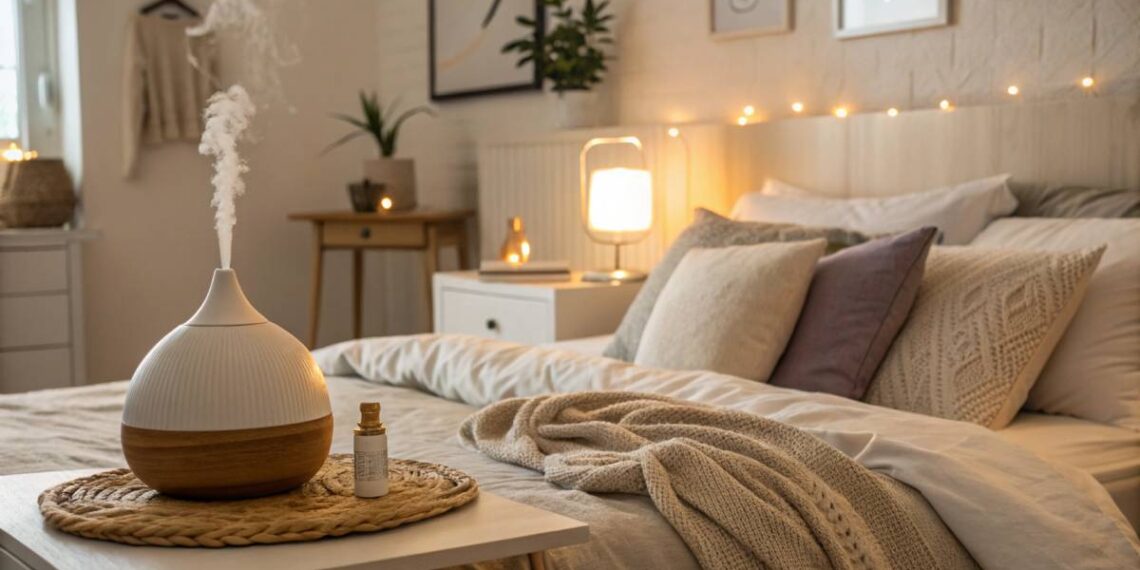Struggling to catch those elusive Z’s? You’re not alone. In our fast-paced, screen-lit world, quality sleep often takes a backseat, leaving us groggy and stressed. Imagine sinking into a night of uninterrupted, rejuvenating rest without relying on medications. This guide uncovers effective, natural strategies to enhance your sleep quality. From simple bedtime routines to the soothing power of aromatherapy, discover how small changes can lead to big sleep improvements. Ready to transform your nights and wake up refreshed? Let’s dive into the art of natural sleep optimization.
Key Takeaways
- Reduce Screen Time: Diminish exposure to blue light by limiting screen usage before bedtime to promote melatonin production.
- Incorporate Exercise: Regular physical activity, especially aerobic and strength training, enhances sleep quality and duration.
- Embrace Aromatherapy: Utilize essential oils like lavender and chamomile to create a calming sleep environment.
- Optimize Sleep Environment: Maintain a cool, dark, and quiet bedroom to foster uninterrupted sleep.
- Adopt Mindfulness Practices: Incorporate meditation and deep breathing exercises to alleviate stress and prepare the mind for rest.
- Choose Sleep-Enhancing Snacks and Beverages: Consume foods and drinks rich in sleep-promoting nutrients, such as almonds and chamomile tea.
Understanding Natural Sleep Remedies
Let’s talk about those nights where counting sheep just doesn’t cut it. Whether you’re tossing and turning every night or looking to cut back on those groggy mornings courtesy of sleep meds, diving into natural sleep fixes is key. So, let’s cozy up to the concept of snoozing the natural way and getting those much-needed Zs.
Why Quality Sleep is a Big Deal
Getting good sleep isn’t just about avoiding crankiness in the morning. It seriously affects everything from your energy to your brain’s performance and even your heart health. If you’ve ever felt like a zombie after a rough night, you’re not alone. According to sleep experts, adults should shoot for 7-9 hours of sleep each night. Here’s a quick peek at recommended sleep times for different ages:
| Age Group | Snooze Hours Needed |
|---|---|
| Newborns (0-3 months) | 14-17 |
| Infants (4-11 months) | 12-15 |
| Toddlers (1-2 years) | 11-14 |
| Preschoolers (3-5 years) | 10-13 |
| School kids (6-13 years) | 9-11 |
| Teens (14-17 years) | 8-10 |
| Adults (18-64 years) | 7-9 |
| Golden oldies (65+ years) | 7-8 |
Getting enough sleep sharpens focus, boosts memory, and cuts down the risk of illnesses. For more tips on catching quality snooze time, check out our posts on natural sleep solutions and finding the best mattress for sleep.
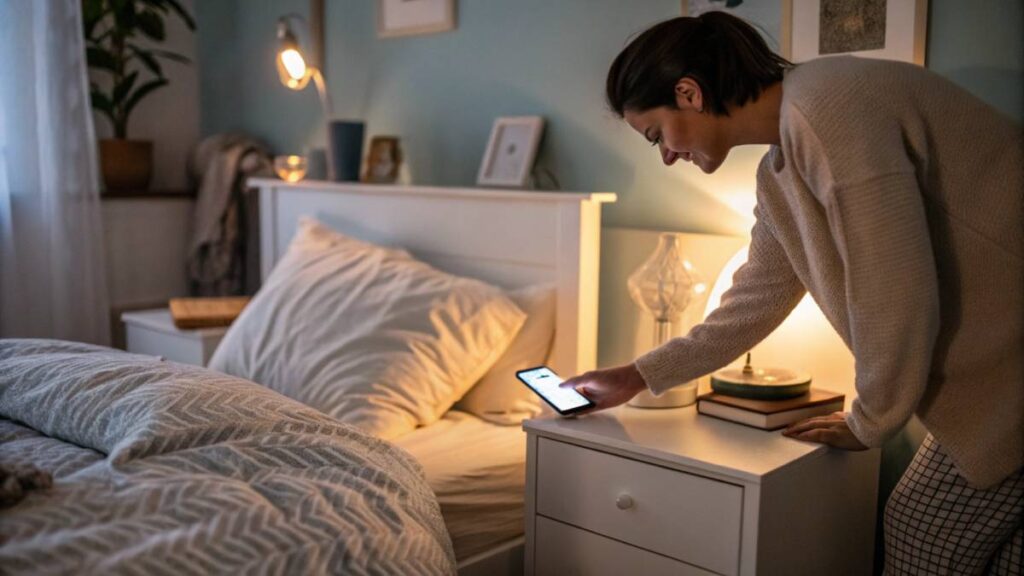
Why Sleeping Naturally Rocks
Going au naturel with your sleep routine has loads of perks. Your body’s got its own savvy system to keep your sleep cycle up and running, and natural methods help keep it dialed just right. Here’s what natural shut-eye can offer:
- Ditching the Pills: Going drug-free avoids those pesky side effects and keeps you from relying too heavily on sleep meds. Curious about natural ways to catch Zs? Dive here.
- Sweet Sleep Quality: Natural techniques deepen sleep, making it more refreshing. Interested? Peek at our guide on natural remedies for sleep apnea.
- Chill Out More: Things like mindfulness squash stress, easing you into dreamland (sleep stress management).
- Boosted Health: Sleep the natural way benefits your immune system, brain health, and keeps your mood steady. Dig deeper into this with stress and sleep solutions.
Turn your evenings into a chill zone! Putting some essential oils for sleep in play and sticking to a calming bedtime routine can work wonders. By taking these natural paths, you’re setting the stage for better and healthier rest.
Setting the Stage for Sleep
Getting the right vibe for your snooze fest is as important as knowing how to fall asleep without using sleep aids. This involves building habits that tell your brain it’s time for bed and crafting a cozy, sleepy-time spot.
Creating a Relaxing Bedtime Routine
Your nightly wind-down sends signals to your mind and body that it’s almost dreamland time. Here’s how to prep yourself for a good night’s rest:
- Consistent Schedule: Hit the sack and rise and shine at the same time every day, even on the weekends (no snooze button party!).
- Warm Bath or Shower: A soak or rinse can chill your muscles and cool down your body’s core, giving a sleepy nudge.
- Reading a Book: Grab a paperback or use an e-reader without the annoying blue light that can jolt you awake.
- Stretching: Some gentle moves or sleep-time yoga stretches can tame the stress monsters in your body and brain.
- Listening to Calming Music: Slow tunes can set the mood for some serious Zs.
- Aromatherapy: Try sleep-inducing oils like lavender or chamomile to get a calm, chill vibe.
Stick to this routine on the regular to train your body into a sleep-friendly groove.
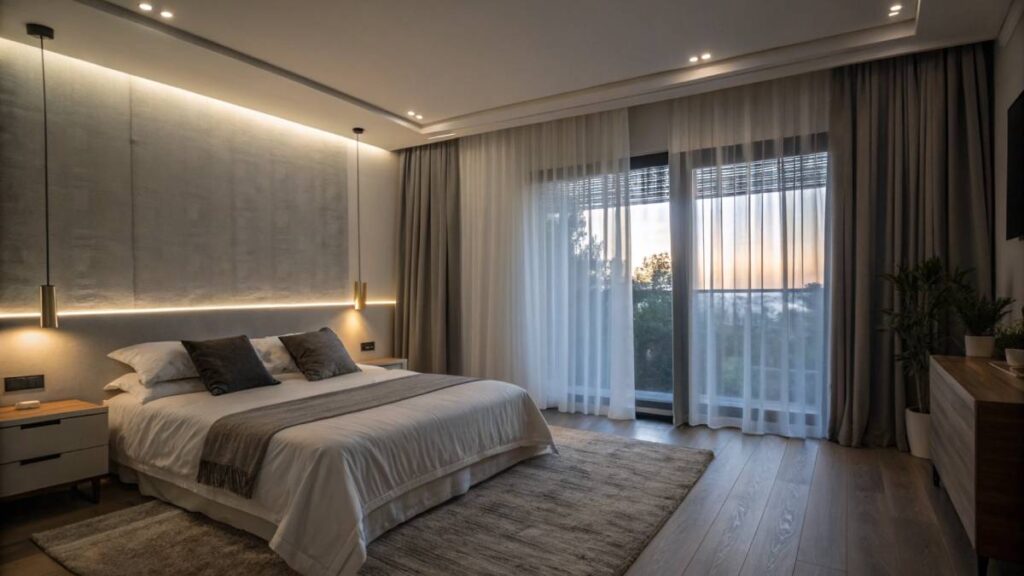
Establishing a Comfortable Sleep Environment
Your snooze zone needs to be sleep-ready. The right setting can really up your sleep game big time.
Temperature
Keeping it cool will do wonders for your beauty sleep.
| Season | Ideal Temperature (°F) |
|---|---|
| Summer | 60-67 |
| Winter | 64-68 |
Bedding
Get your bedding right to sleep tight.
Consider:
- Mattress: A solid mattress keeps the sleep interruptions at bay (best supportive sleep mattress).
- Pillows: Pick ones that line up with how you like to sleep.
- Sheets and Blankets: Go for airy, snug materials.
Lighting
- Dim Lights: Dial down the lights 1-2 hours before calling it a night.
- Blackout Curtains: Block out streetlights or moonbeams to keep it pitch-dark.
Noise Control
- White Noise Machines: Muffle those bothersome background clinks and clatters.
- Ear Plugs: Handy for when the world just won’t quiet down.
Minimal Electronics
Kick the gadgets out of the bedroom to sleep soundly.
- No Screens: Keep the TV, laptops, and phones outside (advantages of a tech-free sleep zone).
Extra Tips
Adding some greenery or picking calming colors can make your sleep pad even more relaxing. Familiar scents and personal touches will also help set the ideal mood for sleep. More gems like these can be found in our guide on a restful bedroom makeover.
By tuning in to these areas, your nights will be as restful as they come, setting you up for quality wink-eye time without all the fuss.
Mindful Practices for Better Sleep
Relaxation Techniques
Wanna hit the hay without the fuss? Relaxation is your new best friend. Imagine it as your backstage pass to Zzz-land, prepping both brain and body for a cozy snooze. Some tried-and-true stressbusters are:
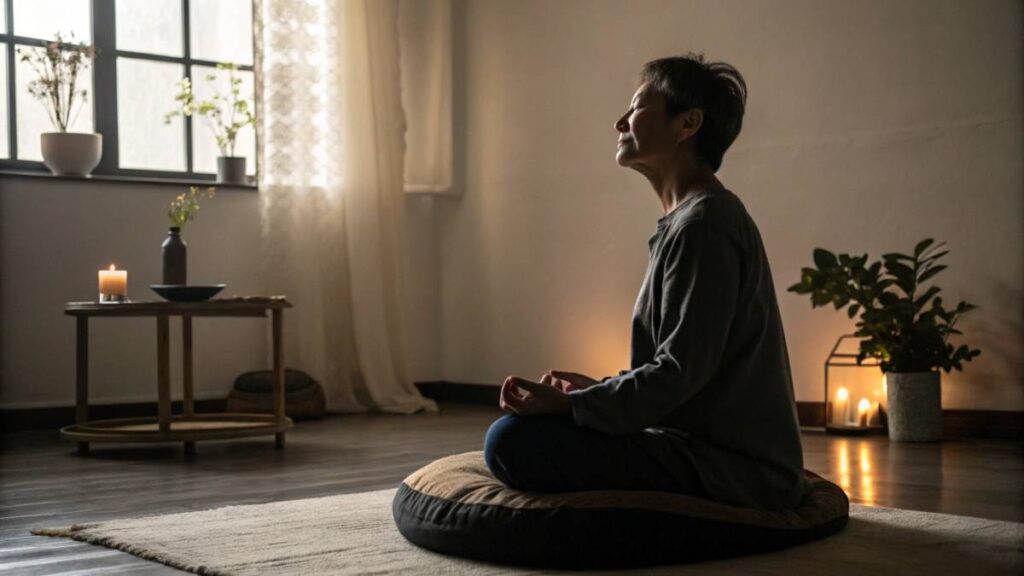
- Deep Breathing: Breathe like you’re the chillest person on earth. Slow, deep breaths can kick stress in the shins and help slip into La La Land.
- Progressive Muscle Relaxation: Squeeze those muscles one by one, like you’re a sponge wringing out tension. Start at your toes and work your way up, slowly uncorking every muscle.
- Visualization: Transport yourself to a peaceful place. Whether it’s a hammock in Hawaii or a quiet forest, picture it till the stress takes a hike.
Give these a whirl before bedtime, and watch how they pull a magic trick on your sleep troubles. Curious about more nighttime hacks? Take a peek at our piece on bedtime routine for adults.
Meditation and Mindfulness
Let’s face it, life’s a whirlwind, but meditation and mindfulness are your zen lifebuoys. By keeping your mind in the now, these practices send stress packing and beckon relaxation.
- Mindfulness Meditation: Park yourself somewhere comfy, eyes closed, and become one with your breath. If your thoughts play hopscotch, just gently rewind your focus.
- Guided Meditation: Pop in your earbuds and let a calming voice guide you to calm town. Perfect for clearing the mind fog and tucking yourself in.
- Body Scan Meditation: Mentally meander from your head to your toes, feeling each sensation along the way. Goodbye, tension; hello, serenity.
Weaving a bit of mindfulness into your bedtime routine might just be your golden ticket to slumberland. Interested in diving deeper? Check out our tips on meditation for sleep.
“Mindfulness isn’t difficult, we just need to remember to do it.” – Sharon Salzberg
By folding these mindful practices into your night, you’re setting up camp in a peaceful oasis of sleep. Whether you use deep breaths or meditation, these tricks offer a well-rounded way to catch some quality z’s. Need more backup in battling sleep anxiety? Visit our piece on manage sleep anxiety.
Unleashing the Magic of Aromatherapy
Aromatherapy is nature’s chill pill, tapping into the power of plant oils to help you snooze more peacefully. Essential oils, plucked straight from Mother Nature’s garden, are game-changers for turning your sleepless nights into dream-filled adventures. Dive in as we uncork this fragrant elixir and discover how to fall asleep naturally with a little help from our botanical buddies.
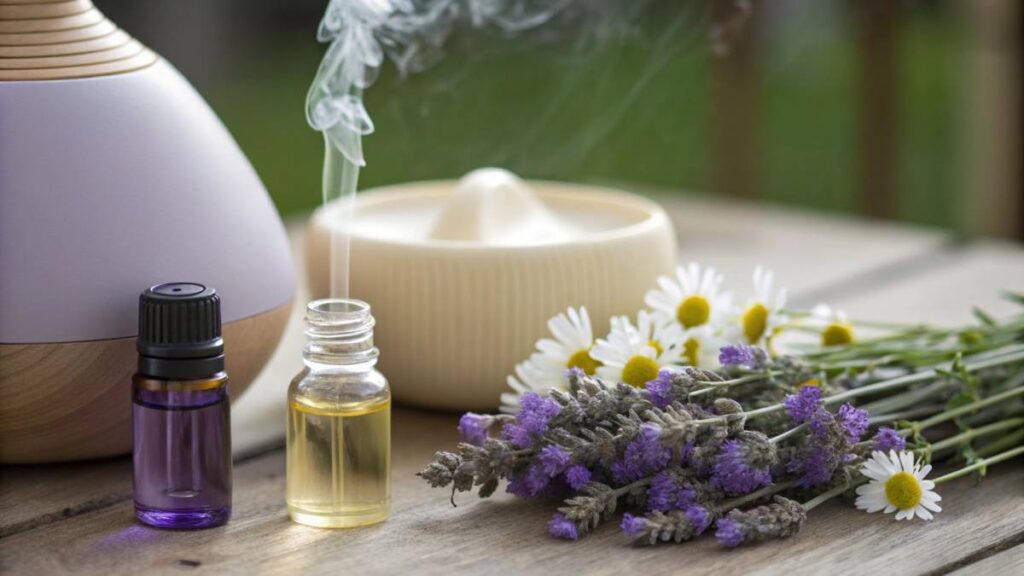
Essential Oils for Dreamland
Some essential oils are like cozy blankets for your brain. With their calming scents, they can shoo away stress and anxiety to create the perfect Zzz zone. Let’s check out some olfactory stars that are high-fiving sleep:
| Essential Oil | Why It Rocks at Bedtime |
|---|---|
| Lavender | Like a gentle hug, it soothes nerves and eases tension. |
| Chamomile | Think of it as a lullaby in a bottle, great for nudging insomnia aside. |
| Valerian | A mild sleepy potion that helps kick insomnia’s butt. |
| Bergamot | Quiets your mind and lowers stress blips. |
| Ylang-Ylang | Slows the pulse down, chills the mind, and lowers blood pressure. |
These heavenly aromas can find their way into your life through diffusers, pillow mists, or as a sweet massage with a base oil. Curious about how to welcome these sleep allies into your routine? Check out our guide to essential oils for sleep.
Aromatherapy: Set the Sleep Mood
Turning your bedroom into a sleepy paradise is a breeze with aromatherapy. Here’s a few tricks to weave essential oils into your nighttime nest:
- Diffusers: A few squirts of your favorite sleepy oil in a diffuser can wrap your room in a cozy fragrance. That gentle mist spreads chill vibes all around, inviting you to relax.
- Pillow Sprays: Mix some drops of essential oil with water for a DIY pillow spray. Spritz it on your linens for a sweet dream kickoff every time your head hits the pillow.
- Bedtime Baths: Stir a little essential oil with a base oil or bath salts before adding to your bath. Soaking in this fragrant brew can untangle muscle knots and usher in sleep.
- Room Sprays: Spray some essential oil—diluted with water—around your room to create a peaceful atmosphere. Let that aroma sing lullabies to your stress, telling your body it’s sleep o’clock.
- Essential Oil Rollers: Roll-on blends of essential oils and carrier oils can be dabbed on pulse points, like wrists and temples, before bed. It’s like a little pre-sleep ritual with aromatherapy as your sleep-savvy partner.
By weaving these aroma-infused practices into your evening, turning your room into a sleep-friendly haven becomes a whole lot easier. Pair these chill vibes with a relaxing bedtime routine and other natural sleep tips to snooze better and wake refreshed.
Hankering for more snooze hacks? Peek at our articles on tuning your diet for dreamland in diet for better sleep and munchies that might help you log those Zzzs in foods for better sleep.
The Role of Nutrition in Sleep
What you eat and drink might just be the secret sauce to getting that elusive good night’s sleep. Certain foods and drinks can set the stage for a restful snooze, nudging your body into sleep mode without much fuss.
Foods that Promote Sleep
Some munchies and nibbles are like sleep’s best friends. They come loaded with stuff like tryptophan, melatonin, and magnesium—big players in the sleep game.
| Snack | Sleepytime Ingredients |
|---|---|
| Almonds | Magnesium that chills your muscles out |
| Turkey | Tryptophan, for that nap-inducing Thanksgiving effect |
| Kiwi | Serotonin, the happy hormone that’s also a sleep buddy |
| Bananas | Potassium and Vitamin B6 for serotonin help |
| Cherries | Naturally packed with melatonin |
Munching on these before hitting the sack might just send you off to dreamland easier. Like almonds, they’re full of magnesium that your muscles will thank you for, or a banana that gives your body’s serotonin factory a good boost.
Curious how chow affects your zzz’s? Take a peek at foods for better sleep.
Beverages to Aid in Sleep
Now, what’s a menu without some sippables? Certain drinks can get you all cozy and ready for bed, thanks to some nifty sleep-inducing compounds.
| Drink | Sleepy Ingredients |
|---|---|
| Chamomile Tea | Apigenin, a chill-out antioxidant |
| Warm Milk | Ol’ reliable, full of tryptophan |
| Herbal Teas (like valerian root) | Soothing vibes in a cup |
| Tart Cherry Juice | Melatonin from nature’s bounty |
Just a sip of chamomile tea can work wonders, thanks to apigenin—your brain’s relaxing buddy. And who hasn’t been told to try some warm milk when sleep won’t come knocking?
For the down-low on how teas can tuck you in, see our article on herbal teas for sleep.
Picking the right bites and sips could be your natural sleep solution, ditching the meds and still scoring those sweet dreams. For extra tricks and hacks on better bedtime eats, don’t skip our diet for better sleep advice.
Getting Cozy with Herbal Sleep Helpers
If you’re out there trying to catch some Z’s in the most earthy way possible, herbs might be your best buds. They’ve been making us all dreamy-eyed for ages and can lull you into a deep slumber without the side effects.
Herbs That Help You Snooze
Certain herbs are basically the Sandman’s helpers. With their soothing vibes, they can give you a hand figuring out how to drift off without counting sheep.
| Herb | What It Does for Sleep |
|---|---|
| Valerian Root | This one’s your sleepy-time ally, often steeped in night-time teas. |
| Chamomile | Chillax with chamomile, a trusty tea that’ll ease your mind. |
| Lavender | Breathe in the fragrance, and let this herb whisper sweet sleep. |
| Lemon Balm | Gives your nerves a hug and sets you up for peaceful shut-eye. |
| Passionflower | Gives a serious knockout punch to insomnia and anxiety. |
Check out which herbs can rock your sleep world in our all-in-one article on best natural sleep aids.
Bringing Herbal Magic into Bedtime
Adding some herbal flair to your evening? Easy peasy! Here’s how to sprinkle a little herb on your nightly wind-down routine:
- Sipping On Herbal Teas: A mug of warm herbal tea, like chamomile or valerian, about half an hour before tucking in can melt away your day’s stress. Scope out more options in our take on herbal teas for sleep.
- Diffuse with Aromatherapy: Get that room smelling oh-so-relaxing with essential oils from lavender or lemon balm. Our piece on essential oils for sleep can show you the ropes.
- Pop Some Supplements: Capsules or drops with goodies like passionflower or valerian can slide right into your nightly chill-out plan. Dive into our detailed guide on best natural sleep supplements.
- Sink into Herbal Baths: Toss some dried herbs or essential oils into a warm bath. Lavender or chamomile are great pals for easing muscle tension and calming the mind.
“Aromatherapy is the art of using natural oils extracted from flowers, bark, stems, leaves, or citrus fruits to enhance psychological and physical well-being.”
By weaving these soothing herbs into your nightly chill session, you might just kick that dependency on sleep meds to the curb. For more tips and tricks on hitting the hay in natural style, swing by our natural remedies sleep apnea section.
The Impact of Physical Activity
Getting your body moving can work wonders when it comes to catching those much-needed Zs. Getting into the groove with regular exercise can really give your sleep quality a boost, paving the way for a peaceful slumber. Knowing when to break a sweat and how it affects sleep is pretty handy to know.
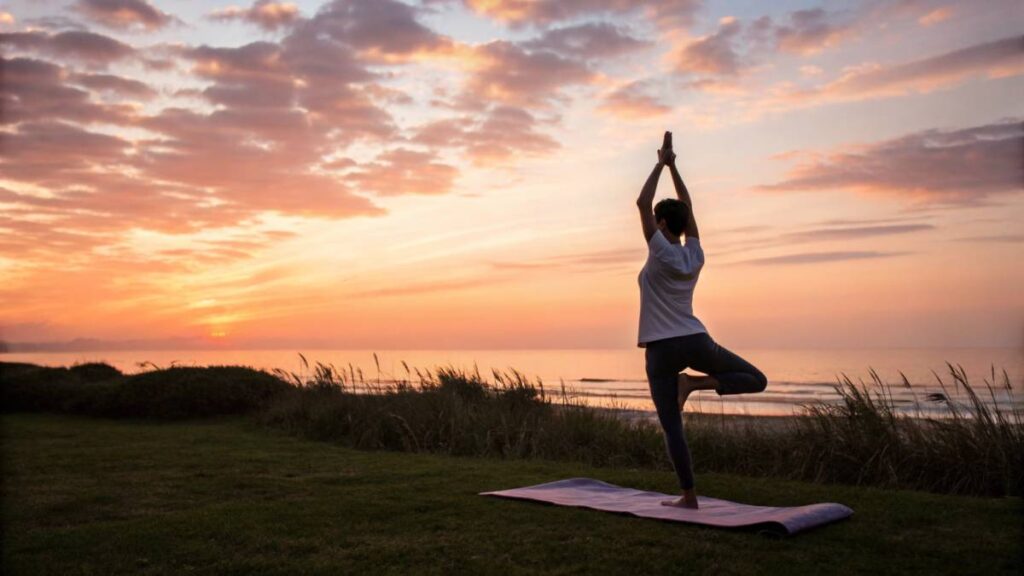
Exercise for Better Sleep
Sweating it out can unleash a flood of endorphins, which are like nature’s mood-lifters, kicking stress and jitters to the curb—both major culprits of restless nights. Plus, keeping active tends to set your internal alarm, helping you snooze right on time.
A brisk walk, a jog around the block, or a few laps at the pool can be the secret ingredients to better sleep. Pumping some iron with weight lifting can also spruce up how you sleep and for how long.
| Type of Exercise | Minutes You Should Aim For | Days per Week |
|---|---|---|
| Aerobic (like walking) | 30 | 5 |
| Strength Training (such as lifting weights) | 20 | 3 |
| Stretching (think yoga) | 15 | 5 |
For more on sleep-friendly exercises, check out how yoga poses can help you sleep.
Timing Your Workouts for Optimal Sleep
Timing really makes a difference when you’re working out for better sleep. If you hit the gym too close to hitting the hay, your body might be too pumped up to unwind. Try to wrap things up a good 2-3 hours before you call it a night.
Knocking out a workout in the morning or afternoon is just the ticket for fixing up your body clock, making it easier to drift off when bedtime rolls around. If evenings are more your style, stick to something easygoing like gentle yoga to wind down.
| When to Workout | Suggested Workouts | Sleep Benefits |
|---|---|---|
| Morning | Aerobic, pumping iron | Peaks alertness, syncs body clock |
| Afternoon | Moderate exercise, stretching | Lifts mood, eases tension |
| Evening | Gentle yoga, stretching | Calms you down, light on sleep disruption |
Want more on merging exercise with other sleep helpers? Hop over to our exercise for better sleep page.
Working in the right moves at the right time can skyrocket your chances of dozing off peacefully, paving the way for healthier sleep in the long haul. Peek at our pieces on atural sleep solutions and top natural sleep aids for more sleep-saving pointers.
Technology Tips for Better Sleep
These days, we rely so much on our gadgets that it’s essential to think about how they mess with our sleep. Here’s how tech can, oddly enough, help you sleep better.
Cutting Screen Time at Night
Can’t sleep well at night? It might be your phone’s fault—well, the blue light coming from it. That light tricks your brain into thinking it’s still daytime, stopping your body from making melatonin, the sleepytime hormone.
Try ditching screens about an hour before you plan to sleep. Tuck your devices in for the night to give your brain the heads-up it needs to wind down. If you absolutely can’t put the screen down, throw on a blue light filter or switch to ‘night mode.’
| Time Before Bed | Action |
|---|---|
| 2 hours | Ease off screens, do something not tech-related |
| 1 hour | Power down gadgets, find something chill to do |
| 30 minutes | Meditate or pick up a real book |
Bedtime is your time to chill and recharge. Swap the phone for a paperback, do some sleepy meditation, or find a mellow playlist. These tips give you a break from buzzing screens. Discover more ways to unplug in our detox guide.
Checking Out Sleep-Boosting Apps
Not all tech is bad for sleep. Some apps are here to be your sleep buddies. They help lock down a bedtime routine, track how you snooze, and toss in sounds or meditations that gently nudge you off to dreamland.
Sleep apps can check out your snooze patterns and highlight what’s up with your sleep quality. Apps can also help you chill out with meditations, soothing sounds, and breathe-easy exercises.
Common features in sleep apps include:
| Feature | Description |
|---|---|
| Sleep Tracking | Checks your sleep stages and highlights patterns |
| Guided Meditations | Offers audio to chill you out, prepping you for dreamland |
| White Noise and Nature Sounds | Plays calming sounds to block out noise |
| Sleep Reminders | Nudges you to stick to a sleep routine |
These gadgets can work alongside other restful sleep tricks like making your bedroom a zen sleep zone or using sleepy scents before bed. Just remember, the point is to use tech smartly to boost your sleep, not to lean on it too much.
Handle your tech well in the evening, and you’ll be setting up a zone that encourages good sleep habits. For more insider info on nodding off naturally, check out our full sleep strategy guide.
Main Tips
- Establish a Consistent Sleep Schedule: Go to bed and wake up at the same time every day to regulate your body’s internal clock.
- Limit Caffeine and Heavy Meals Before Bed: Avoid stimulants and large meals in the hours leading up to bedtime to prevent sleep disruptions.
- Create a Relaxing Bedtime Routine: Engage in calming activities like reading, stretching, or taking a warm bath to signal your body it’s time to sleep.
- Invest in Quality Bedding: A comfortable mattress and supportive pillows can make a significant difference in sleep quality.
- Manage Stress Effectively: Incorporate stress-reducing practices such as meditation, deep breathing, or journaling into your daily routine.
Conclusion
Achieving restful and rejuvenating sleep doesn’t have to be a nightly struggle. By implementing a combination of reducing screen time, engaging in regular exercise, and embracing natural remedies like aromatherapy and herbal aids, you can significantly enhance your sleep quality. Creating a conducive sleep environment—cool, dark, and quiet—further supports uninterrupted rest. Additionally, integrating mindfulness practices and selecting sleep-friendly snacks and beverages can prepare both your body and mind for a peaceful night’s sleep. Remember, consistency is key; establishing a routine that incorporates these elements can train your body’s internal clock and promote healthier sleep patterns. As you adopt these natural strategies, you’ll not only improve your sleep but also boost your overall well-being. Say goodbye to restless nights and hello to energized mornings with these holistic sleep solutions.
Frequently Asked Questions
What are the best natural remedies for improving sleep quality?
Natural remedies such as aromatherapy with essential oils like lavender, establishing a consistent bedtime routine, and incorporating mindfulness practices like meditation can significantly enhance sleep quality.
How does reducing screen time before bed affect sleep?
Limiting screen exposure helps increase melatonin production, making it easier to fall asleep and improving overall sleep quality by signaling to your brain that it’s time to wind down.
Can exercise really help me sleep better?
Yes, regular physical activity, especially aerobic and strength training exercises, can help you fall asleep faster and enjoy deeper sleep by reducing stress and regulating your sleep patterns.
What are some sleep-friendly foods and beverages?
Foods rich in magnesium like almonds, bananas with potassium and Vitamin B6, and beverages such as chamomile tea and warm milk are excellent choices for promoting better sleep.
How can I create a sleep-conducive environment?
Maintain a cool room temperature, use blackout curtains to eliminate light, invest in a comfortable mattress and pillows, and reduce noise with white noise machines or earplugs to create an ideal sleep environment.
Resources
- National Sleep Foundation
- Mayo Clinic on Sleep Tips
- American Psychological Association on Sleep
- Sleep Education by AASM
Final Thoughts
Improving your sleep quality is a multifaceted journey that involves understanding and adjusting various aspects of your lifestyle and environment. By prioritizing natural sleep enhancement techniques—such as reducing screen time, maintaining a regular exercise routine, and utilizing the calming effects of aromatherapy and mindfulness—you can create a robust foundation for healthier sleep patterns. Additionally, optimizing your sleep environment and making mindful choices about your evening routines contribute significantly to achieving restful nights. Embrace these strategies with consistency and patience, and you’ll pave the way for not only better sleep but also enhanced overall well-being. Remember, small changes can lead to substantial improvements, so start implementing these natural sleep solutions today and enjoy the benefits of waking up refreshed and energized every morning.
Recommended Products
- Lavender Essential Oil Diffuser
- Enhance your sleep environment with calming lavender scents.
- Buy on Amazon
- Blue Light Blocking Glasses
- Protect your eyes from harmful blue light emitted by screens before bedtime.
- Buy on Amazon
- Memory Foam Pillow
- Experience unparalleled comfort and support for a restful night’s sleep.
- Buy on Amazon
- Yoga Mat for Bedtime Stretching
- Perfect for gentle evening exercises and stretching routines to relax your body.
- Buy on Amazon
- Chamomile Herbal Tea
- Sip on soothing chamomile tea to calm your mind and prepare for sleep.
- Buy on Amazon

